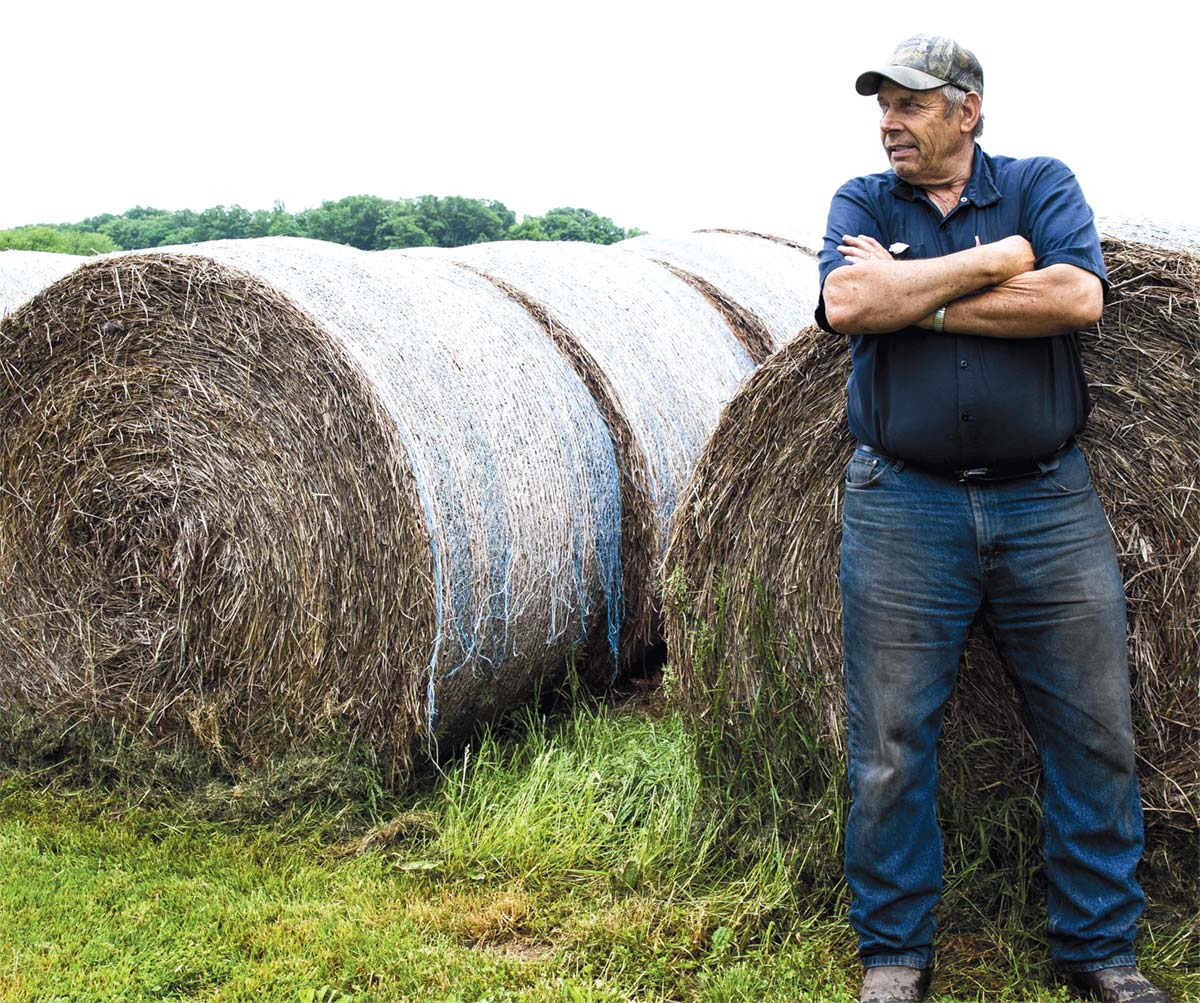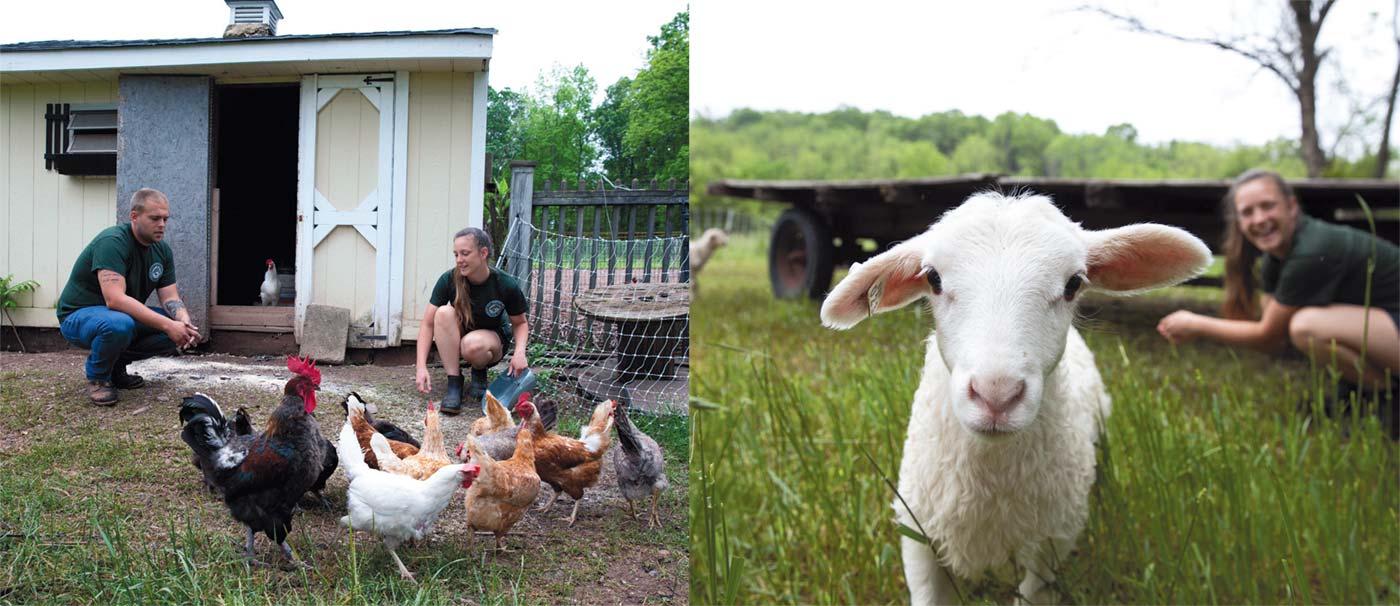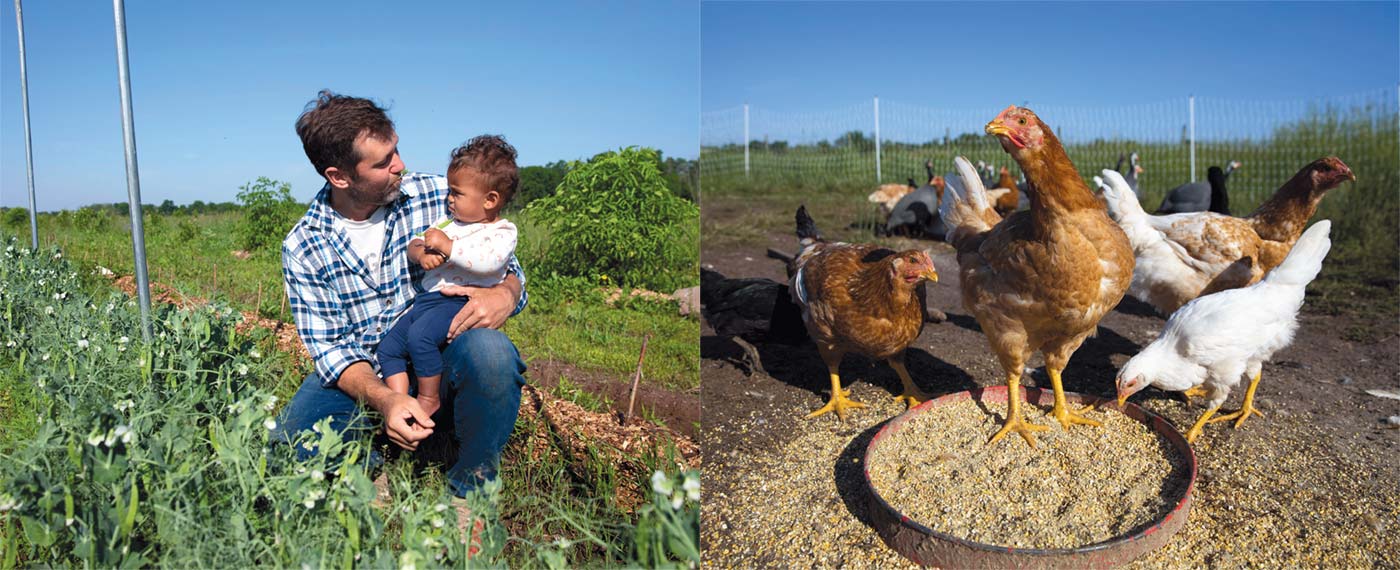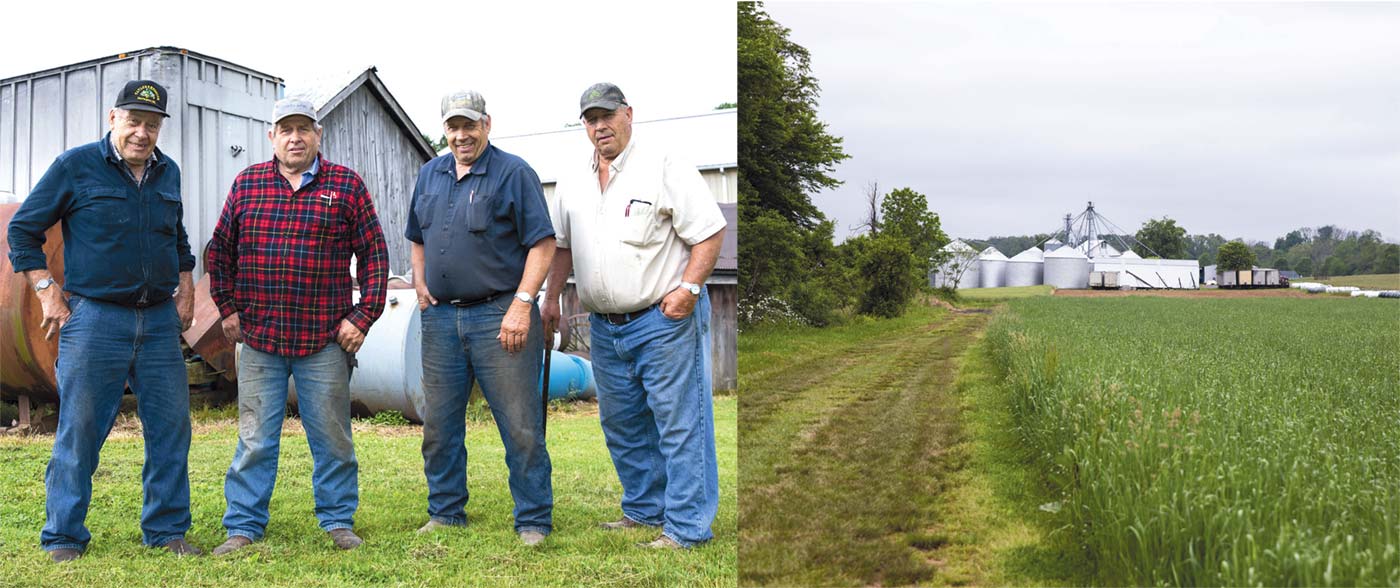The Reality and Future of Farming in Pennsylvania

Wondering about the reality and future of farming in PA? Talk to a family farmer.
LAST YEAR, THE RECORD-SETTING number of Americans quitting their jobs — 47 million — made headlines and was dubbed “The Great Resignation” by economists. That movement shows no signs of slowing, according to the U.S. Department of Labor, which reported 4.4 million departures this past February. But what is turning into a disaster for the corporate world is potentially a much-needed opportunity for the farming sector, particularly in Pennsylvania.
While the state doesn’t have the agricultural clout of California or Iowa, farms are big (and small) business here. We’re number one in the nation for mushroom production and sales, number three for peaches, and fourth for apples, according to a 2021 report from the Pennsylvania Department of Agriculture. No state except for Wisconsin has more dairy farms, by a considerable margin.
Long before the Great Resignation, however, Pennsylvania farms have been grappling with looming worker shortages. Five years ago, more than half the farmers in the state were 55 or older, and once they age out of the business it will be tough to fill their shoes. One study even predicted that just five years from now, there will be 75,000 unfilled agriculture jobs statewide.
But Pennsylvania is in the perfect position to change this. We already lead the country in “young producers,” which is industry speak for farmers age 35 and under. And the current state of affairs, fueled by worker burnout due to low wages, long hours, and a lopsided work-life balance may have plenty of people yearning for the kind of bucolic utopia many imagine running a farm to be.
How does that fantasy compare to reality? To find out, we spoke with three sets of family farmers—each at a different stage of their farm development.

“Farming is a way of life. There’s a simplicity about it that I love. When it’s nice out, I could be working until 9pm. But we tried to make it a priority to to take a rest day and celebrate all those things we enjoy about it.”
THE YOUNG GUNS
First Fruits Farm, Pipersville Chris & Emily Molnar
Although farming wasn’t a first choice for either Chris or Emily Molnar, they quickly realized it was their calling. Emily, now 27, had been in grad school for counseling but dropped it when she discovered the Organic Farming Certificate Program at Delaware Valley University. “I always liked the idea of growing my own food, so I applied immediately,” she says.
Chris, meanwhile, joined the Marine Corps and was planning to become a cop like his dad. But in 2013, at age 19, he needed a heart transplant due to what he calls “a freak genetic mutation.” After his medical discharge in 2015, his career goals changed. Before joining the police force, his father had run a farm, and Chris, now 28, says, “I’ve wanted to have my own farm my whole life.”
He met Emily in the Delaware Valley University program, and the two became inseparable. In 2020, just before the world shut down, Chris closed on a 96-acre property in Pipersville.
A farmhouse dating to 1870 sat on the property, which had once been a working dairy but was most recently used to farm hemp for CBD. No one had grown food there for some time (they had to break through thick sod to make beds), but he and Emily were up to the task. It was, however, complicated by Covid. “The first year was just a weird year,” Chris says. “It took a year just to get it back up and running.”
They both knew they wanted to follow organic practices. For Emily, organic food was just what she had grown up eating, and Chris had begun to watch his diet more carefully after his surgery. Pennsylvania ranks third in the U.S. in organic sales, more than double that of New York— maybe not surprising, given that the organic farming movement was born in eastern Pennsylvania by J.I. Rodale. But organic certifications can be pricey and complicated, which is why many small farms like the Molnars’ don’t have them in spite of following similar protocols.
At First Fruits, they not only follow organic practices, but try to be regenerative, too. Inspired by a permaculture course they took together at another local farm, Chris and Emily, who married in October 2021, are slowly planting an orchard, a few trees at a time, so eventually they’ll add peaches, plums, pears, and apples to their bounty.
It’s only their second growing season, but slowly, with a lot of help from family, friends, and, they say, God, the farm has taken off. The Molnars grow mixed produce, cut flowers, and medicinal herbs that they sell at a roadside stand along Route 611 and weekly at the Plumsteadville Grange farmers’ market, along with chicken and duck eggs and local honey (Emily is a beekeeper).
Their sales model is a familiar one: Pennsylvania ranks second in the country for direct-to-consumer food sales, according to the USDA, with more than 6,200 farms operating this way, to the tune of $600 million in revenue in 2020.
And this year they’ve added livestock as well. “We watched that movie, The Biggest Little Farm,” says Emily, “and that made me want to do it the way it used to be done and have a little bit of everything.” They raise pigs and sheep and rely on word of mouth for sales.
While their education at Del Val helped them know what to expect, experience working at other farms, and their own, proved the best teacher. The local farming community, Chris says, also helped. “Everyone is so supportive and helpful. You can always find someone who does what you want to do: sheep farmers if you want to raise sheep, beekeepers if you want honey.” As a veteran, he talks with a lot of other ex-military farmers, and has found grants specifically for vets.
For now, Chris and Emily have kept other jobs for the winter (at Tractor Supply and Ace Hardware, respectively, because they enjoy the discount), their slow season, but Chris says they are “being patient, and building up so each year gets better and better.”
“Farming is a way of life,” Emily says. “There’s a simplicity about it that I love. When it’s nice out, I could be working until 9pm. But we tried to make it a priority to to take a rest day and celebrate all those things we enjoy about it.”

“As I got older, I got into environmentalism, and I realized that small-scale local farming was the intersection of all that.”
THE SECOND ACT
Plowshare Farms, Pipersville Teddy & Faith Moynihan
Some English teachers have aspirations of writing the great American novel, winning a Pulitzer, or heck, just selling a series to Netflix. But Teddy Moynihan was dreaming of another subject entirely. The northwest Philadelphia high school where he taught had a small learning garden plot on its grounds, and a local farmer would do demonstrations every Friday. Teddy found himself more interested than his students.
Growing up in Connecticut, he was always interested in gardening, though he doesn’t recall much success until he moved to his wife, Faith’s, hometown in lower Bucks County, where the soil is more fertile.
“The idea of eating something we had grown was just about the coolest thing,” he says. “As I got older, I got into environmentalism, and I realized that small-scale local farming was the intersection of all that.”
After peppering the farmer at his school with questions week after week, Teddy started to get serious about a career change. “One of my best and worst traits is thinking, ‘Oh yeah, I can do that,’” he says. He spent his first year farming in Westville, New Jersey, on a tiny suburban plot he describes as “basically someone’s back yard.” Then a friend who was looking to get out of farming offered to rent Teddy land in Pipersville. He accepted, although in retrospect, he says, “I would have done well to spend more time working on another farm first.”
Fortunately, his friend was there to coach him (in exchange for free labor on the construction of his new home) and what they didn’t know, Teddy, in typical teacher style, would research online. “We watched so many YouTube videos,” he says. “There’s hardly a single thing I plant that I don’t Google first.”
Faith’s job as a lesson and curriculum developer for an education technology company meant that the Moynihan household still had steady income and health insurance should this farming experiment fail. It’s a situation that’s not at all uncommon; such farms are sometimes called “hobby farms” because the operators continue to hold down full- time jobs. According to the 2017 USDA Census of Agriculture report, more than half of all farms in Pennsylvania had sales of less than $10,000. For comparison, the USDA defines a “small farm” as one with less than $250,000 in annual agricultural product sales.
“The first few years, you just go off of pure passion and persistence,” Teddy says. “For a lot of farmers, their passion for their own product is contagious enough. I always had a green thumb and a knack for selling stuff.” What he was less savvy about was the business side of farming: how (and when) to scale, hiring employees, keeping books. But he carved out his own way of doing things.
“The definition of farming is expanding,” says Teddy. “There are so many different ways to get into it; you don’t have to just be a market farmer or a CSA farmer.” One way he has found is to work with local restaurants— his friend had established contacts with many, including Irwin’s Upstairs, a.Kitchen + bar, and Friday Saturday Sunday—and breweries. “The microbrewery revolution has been on seemingly the same timeline as local farming, so it opened up a market for growing hops and small grains,” Teddy says. He started working with Free Will Brewery in Perkasie, which opened two years before he got into farming. Right now, he’s growing a bunch of elderberries for sour beers.
Similarly, he’ll sit down with chefs in January and flip through seed catalogs, working out what vegetables to grow for their menu. “Something like an heirloom tomato, there is a huge flavor and quality difference when it’s small-scale and organically grown,” he says. He even grew what was rumored to be the original “Philadelphia long hot,” a pepper whose seeds local gardeners and cooks have been saving and passing down year after year. And because a lot of heirloom crops don’t have a high yield, it works well in Plowshare’s limited space. (Though the property is around 70 acres in total, they only farm three or four acres at most; the rest is for pasturing animals, a deer fence, and cover crops.)
Teddy ultimately decided to add livestock when, he says, “I realized just how important meat was to a local diet.” His family, including his infant daughter and 7-year- old son, eat what they grow on the farm, so ensuring everything was organic and humanely raised was important to him.
He started with sheep because, he says, he “read it was a good place to start.” The flock was 65 strong when he decided to sell it during Covid and focus on broiler chickens instead, at his son’s request. “We joke that our son is the only real farmer in the family, since he’s the only one who grew up doing it,” Teddy says.
They raise pigs as well. “We’ve put so much into the farm, both the soil, the relationships, and the lifestyle,” Teddy says. “I could hardly imagine having to buy meat at the grocery store.”
Restaurant work led to the rise of what may arguably be Plowshare’s biggest success. “Someone asked us to come into a restaurant and do a farm-to-table dinner,” Teddy says. After doing one in a restaurant, he thought, why not host dinners on the farm? Four or five times a year, they invite chefs who have been using their products to come out to the farm and cook on the grill, have a bartender friend put together a cocktail menu using all local ingredients, and sell tickets on Instagram.
“It’s a simple and rustic vibe that works well with the food we grow,” he says. “My favorite part of farming is cooking.”

“It’s not like a normal 9–5 job. As the seasons change, your job changes.”
THE LEGACY
Rook Farms, Ivyland The Rook Brothers
If you’re a fan of the sweet corn at your local Acme or ShopRite, you can thank the Rook brothers. “There’s probably nothing that’s any fresher in the supermarket,” says Barry. “It’s picked that morning and in stores by 9am.”
At 72, Barry and his twin brother, Benny, are the youngest of four brothers who own 350 acres and farm another 3,000 around Bucks County. Ninety of those acres are devoted to sweet corn. Barry, Benny, and their older brothers Bill, 75, and Bob, 78, are the last in four generations of Rook family farmers.
Their great-grandfather, who was a farmer in Germany, came to America in the 1880s and purchased 54 acres. When his son took over, he farmed that land until he died, in the exact room he was born in. The only thing that changed over the years was the amount of land, which grew as they acquired a parcel here and there.
It was a foregone conclusion, Barry says, that he and his brothers would take over the business, even though, growing up in the 1960s, “Farmers were kind of looked down on,” he says. In spite of that, he always enjoyed farming.
“It’s not like a normal 9–5 job,” he says. “As the seasons change, your job changes.” Plus, he says, by the time he was 10 years old, he knew all the operations of the farm except for finances, just by tagging along with his parents as they did their daily chores.
Of course, farming has changed a lot since then. “My dad worked with horses. Now we have tractors,” Barry says. And his favorite: combines for harvesting the fields of wheat, corn, and soybeans. Mechanization and other technology has made it easier to cover a lot more ground; the Rooks farm their hundreds of acres pretty much unassisted, except for some of their children’s school-aged friends who come during harvests to help crate corn and bale hay, sometimes working from the wee hours of the morning until 8 or 9am. Along with the pay, one of Barry’s sisters-in-law will cook a huge dinner to thank them.
As a result of mechanical and technological advances, Barry says, “A lot of your family farms have gotten pretty big.” You might see “family farms” that are 10,000 acres or more, but being small still has its advantages. “If you’re small, you can do more,” he says. “Something like 10 to 12 percent of farmers grow 75 percent of the food in this country. Corporate farms are only 2 percent.”
Unlike the farms of his father’s era, there is no livestock to keep after. “Years ago, all small farms had at least a small dairy and some chickens,” he says. That was mostly to feed the farmer and his family. Barry recalls that growing up, he and his brothers didn’t eat anything the family could sell, so they ended up with what he calls “unclassified potatoes,” the kind you might find in a discount bin or Misfit Market today. The only animals on the Rook farm are cats that pretty much have run of the place.
The weather has also changed. When Barry was a boy, mature trees were sparse. Now, they’re everywhere. And, as in the rainforests, the more trees you have, the more water you have. “Farmers live by the weather,” he says. “You have to be so adjustable.” He recalls a few years back when a tornado took out a farm in Horsham. “The corn was as flat as this table, it was a total loss,” he says. “You need the temperament for farming. It’s rewarding but you have to have the stomach for it.”
Even when dealing with “only” crops, there’s plenty to contend with: early frost, diseases, pests, and deer. Barry estimates he loses 100,000 plants each season to the deer, and he over-plants to accommodate that loss. “Planting is everything,” he says. “When you plant and where you plant, that’s what you have for the rest of the season. You don’t want to plant too fast or too much.”
Ultimately, he says, you get out of farming what you put into it, and he has regularly worked 60 to 100 hours a week his whole life. “It is not conducive to family life,” says his wife, Terri, who moved to Bucks County from Philadelphia when she was a kid. She concedes, however, “It is a nice place to raise kids because of all the good parts of farming: eating fresh food, living simpler.”
Among them, the Rook brothers have eight children, and they’ve all worked on the farm at some point, boys and girls. But when it comes to who might take up the helm of the more-than-century-old family business when this generation is done—“when we give up,” as Barry puts it—there is no clear answer. But neither has the idea of any outsider taking over ever been entertained.
“Family farms can be a little difficult from time to time,” Barry says. “There are generational differences.”
Like when his daughter challenged him on New Jersey versus Pennsylvania sweet corn. Barry brought her several ears from the family fields and had her try them. “She said, ‘OK, Dad, you’re right, that’s pretty good corn!’” he recalls. There is something to be said for tradition.
PA FARMS AT A GLANCE*
- 2.6 Billion crops sold annually
- 139 Acres of the average PA farm
- 25% Of land in the state of PA is farmland
- 53,000 Farms call PA home (est.)
*Source: the USDA National Institute of Food and Agriculture



